- Home
- Josie Brown
True Hollywood Lies Page 11
True Hollywood Lies Read online
Page 11
“My what?”
“Don’t play coy, Hannah. It is so unbecoming. I mean, what were you possibly thinking, inviting Mick here? We are supposed to be working, remember?”
I wasn’t coy. I was livid.
“Wait—wait just a minute! In the first place, I didn’t call Mick. He just showed up. He’s part of your entourage, remember? Not mine. And in the second place, your idea of work—Ha! You’ve got to be kidding! It was you who—now, don’t tell me you weren’t planning to—I mean, asking me to ‘order in room service,’ and to—to call off Prudence K., and inferring that we were going to ‘hit the sack early’—why, you wanted . . . didn’t you? Didn’t you want—”
“Want what?”
Waves of emotion washed over his face: first anger, then confusion, followed by disbelief and finally (to my embarrassment) amusement.
“I don’t believe you thought—you thought that I—I wanted us—” He paused. Then, with patronizing politeness, he added, “Hannah, I’m flattered that you’d even think about me that way, but the truth is, you’re just not my type.”
Not his type.
“I’m . . . not?” That slipped out before I had a chance to think about what I was saying.
Wasn’t any woman breathing his type?
As if I cared!
But I did.
I mean, if I wasn’t his type, then whose type was I?
I was hurt. And embarrassed. And angry. Still, with all the dignity I could muster, I calmly rose. “Well. . . isn’t that a relief! I’ll—I’ll just go pack my things. I’ve got to check flights back to—to Los Angeles.”
“Look, Hannah, I didn’t mean to hurt you—”
“I’m not hurt! In fact, I’m somewhat relieved.”
“Relieved?” Nothing moved on Louis’s face except that telltale eyebrow.
“Of course,” I said blithely. “If I even thought you could be attracted to me, why, I’d just have to quit. I mean, there would be no way I could do this job . . . right?”
I laughed, hoping that it didn’t sound as hysterical as I felt, but then again, exorbitant credit card debt and legal fees had a way of doing that to a person.
“Face it, Louis, you live to break hearts. But guess what? Mine has already been broken, so there’s no way you could ever hurt me. So let me put your mind at ease that you’ll never have to worry about hurting my feelings, okay? Not that I’d even give you a chance, because I’m out of here. And, I assume, with some decent severance.”
I was already at the elevator when I felt his hand on my shoulder. He turned me around, cupping his hand under my chin so that I’d look right into those beautiful eyes of his.
“Look, I think we’ve both misunderstood what happened last night. What say we start with a clean slate? It’s just a job, right, like you said.” When he saw me shake my head doubtfully, he added, “And you’re right about another thing: I am a heartbreaker—which is why I want you to stick around.”
“I don’t get it.”
“We’re a great team because you, as you so eloquently put it, can’t get your heart broken. And since the last thing I need is an assistant who falls in love with me and complicates things, that one asset alone makes you invaluable to me.”
In some cockeyed way, his logic made sense . . . if it had been true.
It was, as far as Louis was concerned. He made that abundantly clear by the way he assumed what my next move would be:
To do whatever he needed to have done.
“Now, go call the limo driver and tell him to be downstairs in ten minutes.” Grinning he gave me a gentle nudge into the waiting elevator.
Before the door closed completely, Louis called out, “Oh, uh, Hannah, one more thing: ask him to meet us at the side door, the one that comes out on Sixth Avenue.”
“But, why?”
“Let’s just say that it’s the best way for us to make a quiet getaway. You see, I, er, bumped into a couple of fans in the lobby last night… after your little drama queen scene. Seems that they’d been waiting hours for a glimpse of me, you know? Didn’t want to disappoint them, right? Well, one thing led to another, and I asked them to join me for a nightcap . . . in my room.” He grinned at the memory. “Wouldn’t you know it, I had a hell of a time convincing them that the party was over . . . Mick, that bastard, was no help at all. He wouldn’t take them off my hands! Well, the bellboy just tipped me off that they’re still hanging out in the lobby. I think they’re looking for an encore, know what I mean? Believe me, I can do without the tears. I wish every girl was as hard-hearted as you, love.”
When I got back to my room, there were two dozen yellow roses waiting for me. The card read: “Didn’t mean to interrupt your plans. Still missing you. So sorry.”
Oh yeah? Well, so was I.
Which I guess blows my reputation for being a hard-hearted drama queen.
* * *
Our flight over the pond was as uneventful as I could have wished for.
Did I use the word “uneventful”? Considering what the last 72 hours had been like, I guess that works. Sure, Louis exchanged telephone numbers with a couple of Virgin flight attendants. And of course he chatted up the girl lucky enough to have been seated across the aisle from him—some adorable young titled tootsie—and made a date to meet her later that night at some hot Europop nightclub.
But otherwise, he was the perfect gentleman. In fact, he was—well, humane.
For example, he insisted that I take the window seat.
Then when I dozed off, he covered me with a blanket.
And when I woke up, I caught him staring down at me, a look of immense sadness in his eyes.
“What’s—what’s wrong?” I sat up straight. Had they made some sort of announcement that the flight was doomed? Had he written off his chance of winning an Oscar?
Or had he changed his mind about my working for him, and was trying to come up with the words that would let me down easy?
He smiled wanly and pointed toward the window. “Look out there.”
Below us, as we descended to 15,000 feet, I could make out a river coiling through a lush green terrain.
“That’s the Thames,” he said longingly. “Beautiful, isn’t it?” Unconsciously, he laid his hand over mine.
It didn’t move from that spot until fifteen minutes later, when it was announced over the intercom, in a very polite British manner, that we’d been cleared for landing, so it would be appreciated if we’d put our seats and our tray tables in an upright position.
* * *
There are many ways in which I could describe Louis’s UK posse, which consisted of two of his childhood “mates” from Manchester, the stout, boisterous Andy and the redheaded Jim—as well as Nigel, a fellow actor from his BBC days, who was easily recognizable as a stalwart of the West End based on his ability to play characters of the “Yes Minister” variety and Louis’s brother, Chaz, who, unfortunately for him, had none of his younger sibling’s good looks. Friendly? Certainly. Flirtatious? Most definitely, if the terms they threw at Louis to describe his luck in having me with him (“Still being mollycoddled, I see” and “What a lucky bloke you are, finding this dolly bird to follow you around, eh?”) were any indication.
They certainly weren’t the types to cut him any slack because he was now famous.
Which, I came to realize, was just what Louis wanted.
Wanted? Make that needed. Instantaneously, the star attitude was gone. In its place, a happy, gracious, and almost modest human being emerged, one who insisted on carrying his bags himself (as opposed to having me run around and beg a skycap to do so), joshed around with his pals without feeling the need to lay them out and, with the utmost gosh-gee-golly politeness, signed autographs for the awed fans who came up and asked.
I was beginning to like this Louis.
But then his brother mentioned his father, and it all went to hell in a hand basket.
“Bugger it, what does that pain in the arse want?” Louis mut
tered when Chaz let it slip that “the old man” had been by to see their ma.
“The usual,” Chaz grunted back.
“Tell her that I’ll take care of him.”
No more Mr. Nice Guy. Louis the Prodigal Son was home.
“Tell her yourself. She came in all the way from Manchester. She’s waiting to see you, in that very nice hotel suite your gal here ordered. And Kathy and her brood are with her, too.”
Was Ernestine J., as ordered by me in a more naive and innocent era, also there, ready, willing and able to give Louis his welcome-home “massage”?
That thought hit both Louis and me at the exact same moment. All the color that went out of his face must have flowed into mine, because I could feel my ears turn red.
Looking from one of us to the other, Chaz snickered, “It was sure sweet of Hannah to suggest that they meet you here. Why, it’s a regular welcome home party!” He and the others laughed riotously. “Don’t worry, little brother, the boys here and I still remember fondly those ‘little rituals’ of yours. When Ma mentioned they were coming, we did you the favor of making sure the room was, shall we say, ‘presentable’?”
Visibly breathing a sigh of relief, Louis gave me a look that said: You’re off the hook . . . for now.
“That driver-pimp of yours, Alfonse, is keeping your little good luck charm safe and sound, in the limo,” said Nigel briskly. “While you and Chaz visit with the folks, the boys here and I will take the li’l bird over to the pub around the corner. Oh, by the way, that reminds me: I take it she’ll be satisfied with a couple of pints and a quid or two, am I right? No? What—a thousand pounds? Blimey, she’s a posh one, eh? Well then, I’d better hold onto your charge card. You’ll want us to keep her happy ‘til you can join us, now won’t you? Oh, uh, thanks, Hannah. I say, you are a sport!”
* * *
“So, you’re taking care of me boy now?”
Edie Trollope, a fragile, porcelain doll of a woman whose faded cornflower blue eyes never once left the face of her youngest son as he hugged his sister, wrestled with his rambunctious nephews, and gamely jibed his brother, was able to convey anxious concern, bittersweet reminiscence, and maternal pride all in that one simple question, delivered in the distinctive cadence of her northern roots.
Louis would never have a more adoring fan.
I laughed uncomfortably. Considering all of my missteps to date, a more apt description was that her son and I were merely tolerating each other. And that was all.
Maybe.
But how do you say that to a doting mom? You don’t. Which is why instead I answered, “He’s a wonderful actor. It’s an honor to work with him.”
Reluctantly Edie forced herself to glance away from the most beloved of her progeny in order to look me right in the eye. “You’re a lot like Sam.”
I didn’t know if, in Edie’s mind, that was a good thing or not. Considering the sadness in her voice, though, I would guess that she saw it as unfortunate. For some reason, it mattered to me that she not assume Samantha and I were to suffer the same fate; and, more importantly to her, that her Louis was in better, more capable hands.
“I wouldn’t know,” I answered politely. “I’ve never met Louis’s former assistant. Although I hear she was quite efficient. I hope Louis finds me the same.”
I would have thought this would have appeased her and she would then return to the joy of reveling in all things Louis. But it didn’t. Instead, she scrutinized me even more closely before coming to her verdict.
“My guess is that he will.” Edie sighed deeply. “Pity.”
“Oh? I’m—I’m sorry, I don’t know what you mean.”
“My son is a lot like his father—”
Just then Louis looked over, almost as if he knew he was the topic at hand. Smiling wickedly, he disengaged himself from the tangle of squirming little boys who’d engulfed him playfully. Despite the cavernous dimensions of the sumptuous suite, his suave swagger would put him beside us in no time at all. Realizing this, his mother concluded with a few well-chosen words—
“So, my dear, I’ll give you the same advice I gave Sam: don’t fall pregnant, now. Because Louis, God help him, isn’t the type to stand beside you if you do. Sod it, if only someone had warned me to do the same when I was sweet on his father, I wouldn’t be such a bitter old woman now.”
Feeling Louis’s arms envelop her waist, Edie indulged in her unwavering adoration once again.
* * *
“Fancy going for coffee?”
Louis’s question took me by surprise. The suite was finally quiet, what with Edie, Kathy and the kids safely ensconced on the train back to Manchester (a trip that should prove to be three highly charged hours, thanks to all the naughty ideas Louis put in the boys’ heads about how they could “drive their mum narky”). The notoriously overbooked Ernestine J., payment in hand, had defected not long after being treated by the boys to a hearty breakfast of bangers, mash and ale, and, along with Chaz, Louis’s mates were off attending to any obligations that might stand in their way of hanging with the King of Players later that evening.
Which meant that Louis and I were all alone.
He’d been granted a day’s rest in order to facilitate any jet lag—which I was certainly feeling, despite the early afternoon hour. I’d assumed Louis was also tired, but obviously I was mistaken. He was up and raring to go.
Ah, my kingdom for an Ernestine J.!
“Hmmm . . . coffee . . .” Well, if anything was going to keep me from crashing, that would. “Ummm . . . does it have to be Jamaican Blue? Because, I’ll be honest with you, I don’t know where we’ll find some in this town—”
“What do you take me for, some kind of sodding twit or something? Bollocks, no! Just. . . just a cuppa of something black. Anything at all.” He reached for our coats. “In fact, I’ll let you lead the way.”
“No, this is your turf. I’ll let you lead, but if I see a place I like, we’ll stop.”
“Agreed.” He grinned playfully. “Blimey, it’s been a while since I’ve showed someone around London. It should be interesting.”
With him, it was. We didn’t stop in trendy Kensington, or the beautifully-peopled Chelsea, the oh-so-posh Mayfair, or even hip Notting Hill. No, Louis’s London was centered in down-and-dirty Soho, still—as in Louis’s day—an edgy bohemia inhabited by those on the outer fringe of culture, art and, more importantly, infamy.
“It wasn’t what I’d pictured at all,” I murmured, squinting up at the window of the grimy, three-story walk-up he’d once inhabited on Frith Street. Deceived by the morning’s clouds, I had inconveniently forgotten my sunglasses. (Not Louis. His were always there, a not-so-successful deterrent to the inevitable tap on the shoulder that preceded that disingenuous question: “Aren’t you—you know—him?”)
Although I could not see his eyes, his voice, mellow with memories of a time long past, put his feelings into perspective. “To a bloke from Manchester who was going nowhere fast, it was a bloody get-out-of-jail-free card. My flat mate was Nigel.” He laughed. “I still remember how pathetically long it took him to break me of my native Manchester brogue, to make me sound less—well, what we call ‘Mancunian.’ ” He shook his head in wonder. “I must have cacked up at least forty auditions before I got the hang of proper British elocution. Bugger it! I was such a tosser back then, ready to quit and go home to Manchester each time they’d tell me to bog off—very politely, of course. Used to get so angry that they couldn’t see past me accent.”
“It was only a matter of time, right?”
“Yeah, right.” He sighed deeply. “Bloody hell, those were glorious times! I worked me arse off and enjoyed every damn moment of it! Why, just look around you!” He pointed down the street, which was teeming with youthful exuberance clad in leather jackets, tattered jeans or colorful tights, and even more colorful hair. “It’s just about perfect, isn’t it?”
“Yes. It’s perfect.” It truly was. Because, right now, Louis w
as perfect.
He was so open. And honest. And real.
I was so enjoying the real Louis. And I was proud of him, proud now to be a part of his story.
We stood there for some time, just watching the carnival of Soho street life—the heavy conversations, the pickups, the put-downs, the street vendors, all still there, still very much a part of Louis—until a cloud once again overtook the sun.
“Time for that coffee now, wouldn’t you say?”
We settled on one of his old haunts, Bar Italia, a twenty-four-hour hole-in-the-wall just a block down from his old flat. By the way he gulped down the thick brew of espresso the waiter put in front of him, it was obvious that he liked it even better than the Jamaican Blue after all.
Or perhaps it was being back in the old neighborhood that he liked so much.
Within an hour and a half, he was claiming it was due to the company: me.
But I’m sure that was only because I lent an interested ear as he talked about the very first London production he was cast in (Pinter’s Ashes to Ashes), and the first time he’d gotten critical raves (Stoppard’s The Invention of Love), and the production that got him noticed by American producers in the first place (a West End production of Speed the Plow).
“The damn American producers were looking for a Brit who could speak with an American accent. Well, hell, we were weaned on your cinema! I didn’t know a dude who couldn’t talk as if he’d grown up in the O.C., so I guess I was just lucky that I was the first guy they saw,” Louis explained, in a perfect O.C. drawl. “And to think I almost turned down the Mamet for another revival of Julius Caesar. Ha! Where would my life be if I had?”

 The Housewife Assassin's Horrorscope
The Housewife Assassin's Horrorscope Hollywood Scream Play
Hollywood Scream Play The Housewife Assassin's Fourth Estate Sale
The Housewife Assassin's Fourth Estate Sale Secret Lives Of Husbands And Wives
Secret Lives Of Husbands And Wives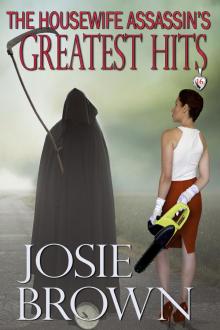 The Housewife Assassin's Greatest Hits
The Housewife Assassin's Greatest Hits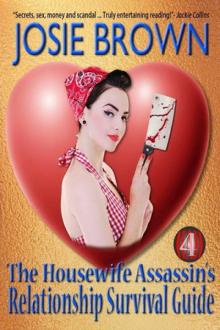 4 The Housewife Assassin's Relationship Survival Guide
4 The Housewife Assassin's Relationship Survival Guide Totlandia: The Onesies, Book 1 (Fall)
Totlandia: The Onesies, Book 1 (Fall) The Housewife Assassin's Tips for Weddings, Weapons, and Warfare (Housewife Assassin Series Book 11)
The Housewife Assassin's Tips for Weddings, Weapons, and Warfare (Housewife Assassin Series Book 11) 3 The Housewife Assassin's Killer Christmas Tips
3 The Housewife Assassin's Killer Christmas Tips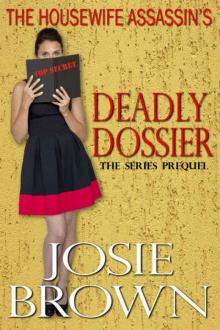 Deadly Dossier
Deadly Dossier True Hollywood Lies
True Hollywood Lies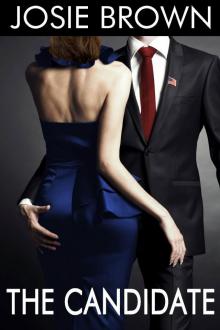 The Candidate (Romantic Suspense) (The Candidate Series)
The Candidate (Romantic Suspense) (The Candidate Series)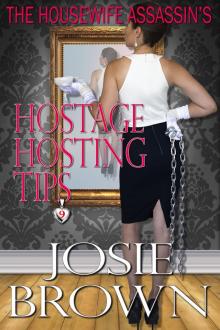 The Housewife Assassin's Hostage Hosting Tips
The Housewife Assassin's Hostage Hosting Tips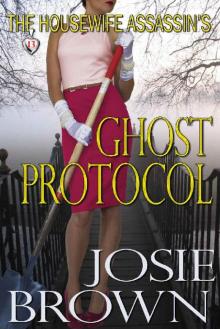 The Housewife Assassin's Ghost Protocol
The Housewife Assassin's Ghost Protocol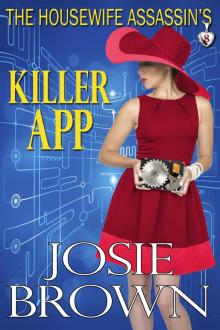 The Housewife Assassin's Killer App
The Housewife Assassin's Killer App The Housewife Assassin's Garden of Deadly Delights
The Housewife Assassin's Garden of Deadly Delights Impossibly Tongue-Tied
Impossibly Tongue-Tied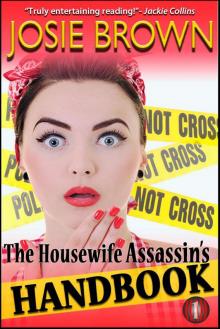 1 The Housewife Assassin's Handbook
1 The Housewife Assassin's Handbook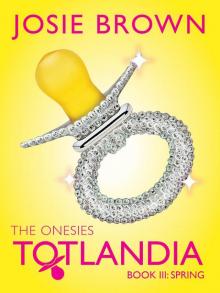 Totlandia: Spring
Totlandia: Spring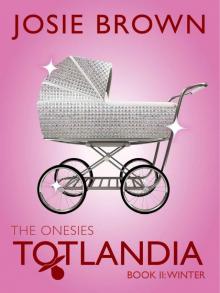 Totlandia: Winter
Totlandia: Winter The Housewife Assassin's Husband Hunting Hints
The Housewife Assassin's Husband Hunting Hints Recipes for Disaster
Recipes for Disaster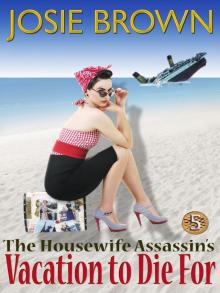 Vacation to Die For
Vacation to Die For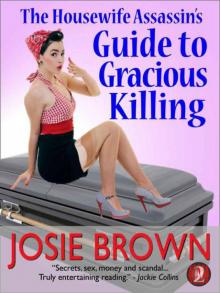 2 The Housewife Assassin's Guide to Gracious Killing
2 The Housewife Assassin's Guide to Gracious Killing The Housewife Assassin's Terrorist TV Guide
The Housewife Assassin's Terrorist TV Guide Spring, The Twosies
Spring, The Twosies